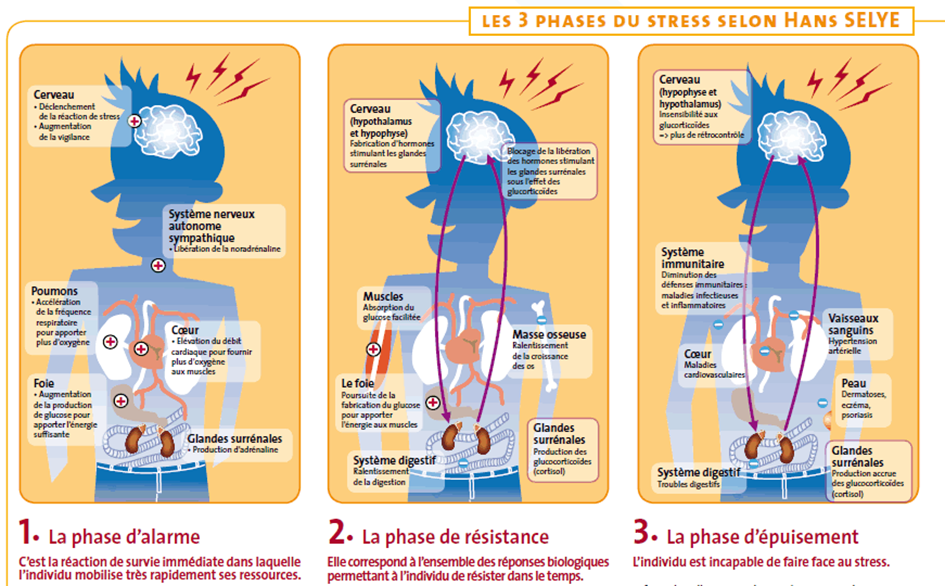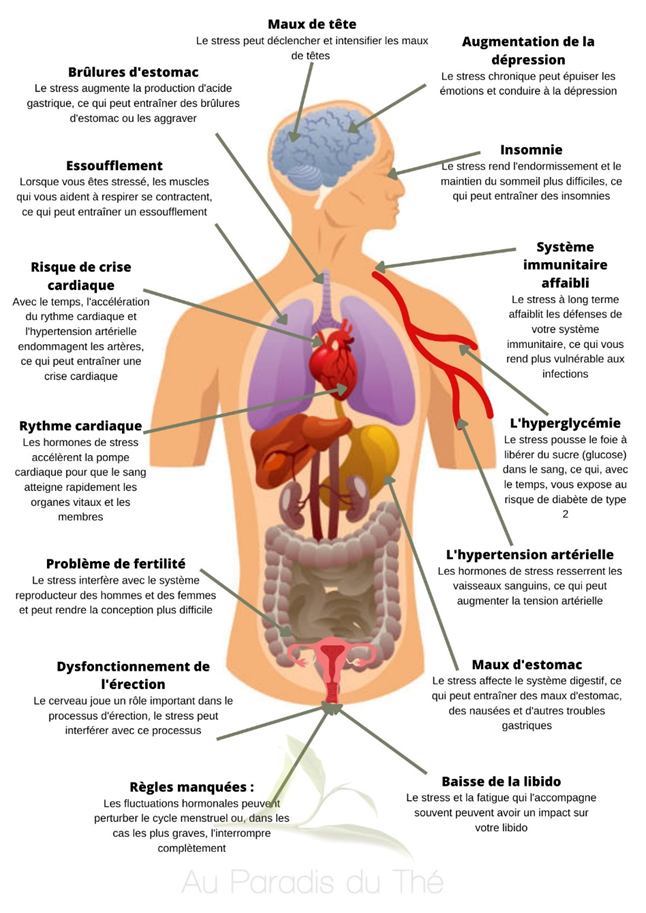https://www.annebaldrankinesio.fr/se-liberer-du-stress.html
Stress and anxiety: Regain balance, harmony and serenity with essential oils
Stress and anxiety are the body's automatic responses to perceived threats, but when they become chronic, they can have significant impacts on our health. In this article, we will examine these phenomena from a scientific angle in order to better understand the mechanisms, reactions and consequences on our body. Then, we will take the path of aromatherapy to discover how to benefit from the support and help of essential oils to find balance, harmony and serenity.
What are Stress and Anxiety?
Stress: This is a biological response to a perceived threat, whether physical, emotional or mental. Cyrulnik (2001), Neuropsychiatrist describes stress as a survival mechanism, allowing the body to prepare to react quickly to a dangerous situation. However, when stress becomes chronic, it can have deleterious effects on physical and mental health, leading to psychosomatic disorders, cardiovascular diseases and a reduction in immune defenses.
Anxiety: Anxiety is often confused with stress. It is characterized by excessive worry and anticipation of dangerous situations. For Cyrulnik, this state is often irrational or disproportionate to reality. It can manifest itself through physical symptoms such as palpitations, tremors, and muscle tension, as well as psychological symptoms such as constant worry, intrusive thoughts, and difficulty concentrating. Anxiety can be exacerbated by genetic, environmental and psychological factors.
The causes of stress and anxiety:
In our modern society, stress and anxiety have become pervasive problems affecting millions of people around the world. These are fueled by various factors:
- Professional pressure: the cult of performance, deadlines, workload,…

https://www.encyclopedie-environnement.org/sante/stress-
Lifestyle: information overload, digital stimuli, social environment;

https://exploreur.univ-toulouse.fr/infobesite-resister-la-surcharge-dinformations
- Financial concerns: bills, loans, increased cost of living, etc.

The mechanisms of stress and anxiety:

https://www.cc-psychologue.com
It all starts in the brain, more precisely in the amgydala, a region involved in the processing of emotions. When the brain perceives a threat, whether a stressful situation or anxious thoughts, the amgydala sends an alarm signal to the brain.
In response to this signal, the hypothalamus, a small gland located in the hoophead, secretes a hormone called corticotropin-releasing hormone (CRH). CRH then stimulates the pituitary gland, a gland under the brain, to release another hormone called adrenocorticotropic hormone (ACTH).
ACTH travels to the adrenal glands, located above the kidneys, and stimulates the release of cortisol, the main stress hormone. Cortisol prepares the body to face threat by increasing the availability of glucose to provide energy to muscles and temporarily suppressing nonessential functions like digestion and the immune system.
Along with the release of cortisol, the sympathetic nervous system is activated. It causes an increase in heart rate, a rise in blood pressure, and an increase in breathing to prepare the body for action.
Together, these physiological responses prepare the body to react to the stressful situation. This is called the “fight or flight” response, which is crucial for survival in the face of immediate physical threats.
In the case of anxiety, this response can be triggered by anticipatory thoughts or apprehensions about the future, without there necessarily being an immediate threat. This can lead to prolonged activation of the stress system, which can have detrimental effects on mental and physical health in the long term.
· One-off stress or acute stress is therefore a rapid and intense reaction of the body to an immediate situation or a particular event. This type of stress is generally short-lived and dissipates once the event has passed.
· Chronic stress lasts a long time and is characterized by a persistent and prolonged state that results from constant or repeated stressors.

https://www.auparadisduthe.com/blog/stress-causes-risques-solutions/
As we saw previously, the consequences of stress and anxiety are harmful to both physical and psychological health. It is necessary and essential not to take your various disorders lightly because they can cause various illnesses which can unfortunately be fatal.
Aromatherapy for stress and anxiety?

https://www.laliberte.ch/news/magazine/page-jeunes/des-boosters-pour-etudiants-636049
According to the journalistic study “Investigation” (2022), in Belgium, more than 1,100,000 doses of anxiolytics and sleeping pills are sold every day in pharmacies! One in 8 Belgians consume it chronically. In France, according to the Medicines Agency (ANSM), the proportions are similar to 1 in 7 French people. If in certain situations the use of this type of treatment is necessary, it should be largely accompanied by psychotherapy in order to limit the duration of this medication and treat in parallel the causes of psychosomatic manifestations.
As part of managing stress and anxiety, we suggest considering the benefits of aromatherapy. Essential oils are concentrated plant extracts that contain volatile aromatic compounds. They have an impact on the management of stress and anxiety thanks to several mechanisms of action, notably through the olfactory system and the brain (do not hesitate to consult the article on this site: “Essential oils : The power and influence of smells on our emotions and our behaviors-Aromatherapy-Olfactotherapy").
When an essential oil is inhaled, its aromatic molecules reach olfactory receptors in the nose, which then send signals to the limbic system in the brain. The limbic system is involved in the regulation of emotions, behaviors, memory and, to some extent, physiological functions such as breathing and heart rate. Certain essential oils can therefore positively influence these functions, thus reducing stress and anxiety.
Additionally, chemical molecules in essential oils, such as linalool and linalyl acetate in True Lavender, can have sedative and anxiolytic effects. They can interact with neurotransmitters in the brain, such as GABA (gamma-aminobutyric acid), which plays a major role in reducing neuronal activity and relaxation.
Essential oils also produce physiological effects, some have anti-inflammatory, antioxidant and muscle relaxant properties which can help relieve and reduce the physical symptoms of stress and anxiety such as muscle tension and inflammation.
The use of essential oils through different treatments (bath, massage, diffusion, etc.) can contribute to a feeling of general well-being bringing relaxation and relaxation.
What are some interesting essential oils?
True or Fine Lavender (Lavandula angustifolia) these properties are relaxing and calming. It is a natural sedative and anxiolytic. It reduces stress and improves sleep quality. It helps combat hyper-emotionality, mood swings and irritability.
Lavender embodies the balance between body and mind, reminding us that serenity is found in the present moment. Its essence evokes a promise of wisdom, serenity and inner peace.
Roman or Noble Chamomile (Chamaemelum nobile) is calming and sedative, making it an excellent choice for reducing anxiety and promoting calm. It relieves insomnia. This essential oil combats bad mood and relieves physical and psychological tension. It promotes self-acceptance and helps overcome fears and anxieties while calming anger.
Bergamot (Citrus bergamia) has anxiolytic properties and can improve mood by reducing feelings of stress and depression. It is renowned for its revitalizing and soothing effects. It’s “sunshine in the bottle” which gives you self-confidence, allowing you to regain courage and the desire to undertake. It acts against agitation, depression, nervousness or stage fright.
Ylang-Ylang (Cananga odorata) has calming and euphoric properties that can reduce nervous tension and balance emotions. It allows you to escape stress and encourages letting go. It protects against disappointments, doubt and lack of confidence.
Garden marjoram (Origanum majorana) these relaxing effects soothe the nervous system and promote restful sleep. Useful in cases of mood disorders, nervous tension or hypertension.
Lemon (Citrus limon) refreshing and energizing. This essential oil improves mood and reduces anxiety. It stimulates concentration, makes you optimistic and develops clarity of mind.
Mandarin (Citrus reticula) is sweet and soothing, interesting for children and sensitive people. It combats mental rumination, agitation, irritability and hyperactivity.
Patchouli (Pogostemon cablin) has calming and grounding properties, it acts on the balance of emotions by reducing nervous and/or physical fatigue but also nervousness and overwork.
Atlas cedar (Cedrus atlantica) this essential oil allows you to center yourself and brings concentration. It fights against mental dispersion. Relieves anxiety, depression, and sadness.
Rosewood (Aniba rosaeodora) is comforting, soothing and balancing. Soothes stress by promoting relaxation. It chases away dark thoughts and stimulates creativity, self-confidence, and allows you to get to the point.
Sweet orange (Citrus sinensis) is calming and soothing, its sweet aroma has a positive effect on mood, allowing you to rediscover the joy of living.
This list is not exhaustive of many essential oils promoting relaxation, relaxation and appeasement thanks to the molecules they contain. For example, as discussed previously, linalool has sedative and anxiolytic properties; linalyl acetate is a calming molecule; Limonene has mood-enhancing effects; a-pinene has calming effects;
* Toutes les huiles essentielles sont disponibles sur ce site.
*Les informations fournies dans cet article sont basées sur la littérature à caractère scientifique et l’expérience acquise au fil des années dans le cadre des différents cursus formatifs. Cependant, elles sont fournies uniquement à des fins d’informations et ne doivent en aucun cas remplacer une prise en charge médicale ou un traitement en cours.
Bibliographic references:
BERNARD, F., & DUBOIS, M. (2011). “Stress and anxiety: Taming serenity.” Ed. Eyrolles.
BOSSON, L. (2018), “aromatherapy: healing with the soul of plants”, Ed; Amyris
CYRULNIK, B. (2001). “A wonderful misfortune.” Ed. Odile Jacob
CYRULNIK, B. (2012). “Run away, life is calling.” Ed. Odile Jacob
GERAUKT, G., SOMMERARD, C. & MARY, R. (2011), “The guide to olfactotherapy: essential oils to heal our body and accompany our emotions”. Ed. Albin Michel
LEJOYEUX, M. (2007). “Anxiety Disorders.” Ed. Flammarion Medicine-Sciences
SCHWEITZER, P. (2015) “Anti-stress essential oils”. Ed. Alpen




The Art of essential oils to relieve stress and anxiety in order to find serenity, balance and harmony